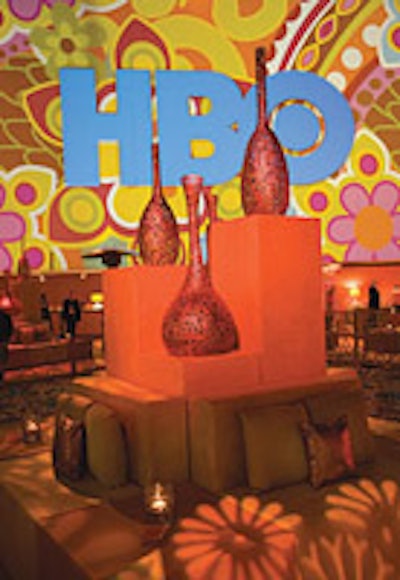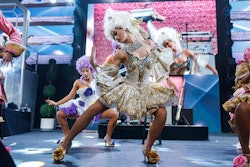
HBO's 2007 Globes fete
Photo: Gabor Ekecs
Although the 2008 Golden Globes ceremony and its spate of related parties got scrapped due to the Writers Guild strike, many event hosts ended up paying their vendors for all or most of the work required for the parties. In many cases, contracts required them to do so, but organizers and vendors said they also kept an eye toward maintaining cordial business relationships in working out such resolutions. They expect these deals to allow next year’s events to go on with the same teams—and in several cases, the same designs.
Time Inc.’s Cyd Wilson, who was working with designer Thomas Ford on In Style’s annual party with Warner Brothers, estimates that more than 50 percent of her event’s costs were in fact paid out, even though the party did not go on, since the work began so early. “We were the only event that had done preproduction three months earlier, the only party that had already built the tents,” Wilson said. So vendors were paid what they were due for the work they had completed.
HBO also paid significant event costs, although it typically sets up later because its Beverly Hilton venue, Circa 55, is open for regular business until Globes weekend. “Most years it’s a real nightmare, since we’ve had to set up the night before and we were the ones that got stuck working all night. This year was the one year it paid off that we couldn’t set up early,” said producer and designer Billy Butchkavitz, who was working on the party’s annual color-filled spectacle. He has committed to paying subvendors who had already done custom work, and a projectionist who had flown in from Poland. “Everything was manufactured, everything was done, with [the official news of the cancellation coming with] six days' notice. Most of the clients I have, a lot of it is done on gentlemen’s agreements. I like to have almost all of my money before the event even happens. You can really get in trouble, [but I’ve been] working with HBO for so long, since 1995, and there’s a trust factor on both ends.” HBO vice president of special events Eileen Rivard said, "Fortunately, because of our long-standing relations with our vendors, we are all working together to minimize losses."Mark Yumkas of Angel City Designs, who was working on NBC Universal’s party with Focus Features, said, “We have a force majeure clause in all our contracts that includes strike cancellations. I was entitled to be paid in full, but due to our long-term relationship with the studio, we came up with a reasonable, fair, and equitable number that satisfied all parties. We were also fortunate that we were able to use our staff on other projects, so the client did not have to pay labor charges. We are on great terms with the client and remain so.” Calls to the office of Hollace Davids, senior vice president of special projects for Universal Pictures Marketing, to confirm contract details were not immediately returned.
Although some vendors and event costs were paid, the number of dollars lost to the general economy is astronomical, says Los Angeles County Economic Development Corporation senior vice president and chief economist Jack Kyser. “The Golden Globes means roughly $60 million to the L.A. economy. Losses were suffered by the NBC television network, Dick Clark Productions, a lot of independent contractors, the Beverly Hilton Hotel, the banquet staff—it’s a pretty broad array. And the strike is now trickling out into the wider economy, now up to $1.6 billion. Going into this one, you knew it was going to be very difficult.”
Indeed, the hotel that typically plays host to the ceremony and parties absorbed considerable loss, according to event hosts. “The [Beverly Hilton] hotel actually ended up taking the biggest hit, because their contract was to be facilitated the night of the event,” said In Style’s Wilson, adding, though, that “we did have some expenses that we already incurred there.”
Beverly Hilton PR director Lynda Simonetti declined to say how many of the hotel’s 569 guest rooms were actually occupied on the night of the Globes' retooled news conference, but said, “We usually host 1,300 for dinner plus 3,000 additional guests at parties, and we didn’t see those numbers actualize. But we have a strong relationship with the Hollywood Foreign Press Association and the parties involved, so we worked with each one of those entities to ensure that we maintained a strong business relationship—we have next year to look at as well.”
Were any event-related losses preventable? Once the strike was brewing, it would have been too late to insure an event against potential cancellation on account of the dispute, says Marc Idelson, senior vice president of HCC Specialty Underwriters, a subsidiary of HCC Insurance Holdings.
“Strikes can be covered, but everyone knew there was going to be a WGA strike and potential SAG and DGA strike, so those wouldn't have been covered—it's almost [like] a preexisting condition," said Idelson, whose company is the world’s largest insurer of event cancellation. "A lot of times contracts cover strikes like hotel or transportation strikes, but when [the dispute is] tied to the participants of an event, that's not normally covered.” Even with the writers and studio heads going back into talks this week, and with the Oscar nominations announced with full fanfare this morning, Idelson says it would nonetheless be too late to insure an Academy Awards event against strike-related problems at this point. “We’d say we can't do it, because that would be bad business for us.”
In brighter news, despite widespread frustration over the cancellation of this year’s parties, much of the work that had already been expended is expected to go toward next year’s Globes-night fetes. "[HBO] had me put everything in storage since everything was designed for that space; it’s all been packaged up and it’s going to make its debut next year,” Butchkavitz said, and HBO's Rivard confirms that the network will try to salvage the items for future use. Angel City’s Yumkas said, “All items that were custom-built and -sewn are being kept in storage and, in all likelihood, will be used for next year's event.” Wendy Luckenbill, vice president of daytime, alternative series, and special projects for the NBC entertainment division, confirmed that the party's design elements are being stored and the team expects to go forward with the look next year.
Wilson, whose group has also put everything in storage for next year, added that this doesn’t necessarily mean In Style will save money on 2009's party. “Actually, we'll have storage and trucking expenses—a lot of other expenses that we [would not otherwise] have,” she said.
Time Inc.’s Cyd Wilson, who was working with designer Thomas Ford on In Style’s annual party with Warner Brothers, estimates that more than 50 percent of her event’s costs were in fact paid out, even though the party did not go on, since the work began so early. “We were the only event that had done preproduction three months earlier, the only party that had already built the tents,” Wilson said. So vendors were paid what they were due for the work they had completed.
HBO also paid significant event costs, although it typically sets up later because its Beverly Hilton venue, Circa 55, is open for regular business until Globes weekend. “Most years it’s a real nightmare, since we’ve had to set up the night before and we were the ones that got stuck working all night. This year was the one year it paid off that we couldn’t set up early,” said producer and designer Billy Butchkavitz, who was working on the party’s annual color-filled spectacle. He has committed to paying subvendors who had already done custom work, and a projectionist who had flown in from Poland. “Everything was manufactured, everything was done, with [the official news of the cancellation coming with] six days' notice. Most of the clients I have, a lot of it is done on gentlemen’s agreements. I like to have almost all of my money before the event even happens. You can really get in trouble, [but I’ve been] working with HBO for so long, since 1995, and there’s a trust factor on both ends.” HBO vice president of special events Eileen Rivard said, "Fortunately, because of our long-standing relations with our vendors, we are all working together to minimize losses."Mark Yumkas of Angel City Designs, who was working on NBC Universal’s party with Focus Features, said, “We have a force majeure clause in all our contracts that includes strike cancellations. I was entitled to be paid in full, but due to our long-term relationship with the studio, we came up with a reasonable, fair, and equitable number that satisfied all parties. We were also fortunate that we were able to use our staff on other projects, so the client did not have to pay labor charges. We are on great terms with the client and remain so.” Calls to the office of Hollace Davids, senior vice president of special projects for Universal Pictures Marketing, to confirm contract details were not immediately returned.
Although some vendors and event costs were paid, the number of dollars lost to the general economy is astronomical, says Los Angeles County Economic Development Corporation senior vice president and chief economist Jack Kyser. “The Golden Globes means roughly $60 million to the L.A. economy. Losses were suffered by the NBC television network, Dick Clark Productions, a lot of independent contractors, the Beverly Hilton Hotel, the banquet staff—it’s a pretty broad array. And the strike is now trickling out into the wider economy, now up to $1.6 billion. Going into this one, you knew it was going to be very difficult.”
Indeed, the hotel that typically plays host to the ceremony and parties absorbed considerable loss, according to event hosts. “The [Beverly Hilton] hotel actually ended up taking the biggest hit, because their contract was to be facilitated the night of the event,” said In Style’s Wilson, adding, though, that “we did have some expenses that we already incurred there.”
Beverly Hilton PR director Lynda Simonetti declined to say how many of the hotel’s 569 guest rooms were actually occupied on the night of the Globes' retooled news conference, but said, “We usually host 1,300 for dinner plus 3,000 additional guests at parties, and we didn’t see those numbers actualize. But we have a strong relationship with the Hollywood Foreign Press Association and the parties involved, so we worked with each one of those entities to ensure that we maintained a strong business relationship—we have next year to look at as well.”
Were any event-related losses preventable? Once the strike was brewing, it would have been too late to insure an event against potential cancellation on account of the dispute, says Marc Idelson, senior vice president of HCC Specialty Underwriters, a subsidiary of HCC Insurance Holdings.
“Strikes can be covered, but everyone knew there was going to be a WGA strike and potential SAG and DGA strike, so those wouldn't have been covered—it's almost [like] a preexisting condition," said Idelson, whose company is the world’s largest insurer of event cancellation. "A lot of times contracts cover strikes like hotel or transportation strikes, but when [the dispute is] tied to the participants of an event, that's not normally covered.” Even with the writers and studio heads going back into talks this week, and with the Oscar nominations announced with full fanfare this morning, Idelson says it would nonetheless be too late to insure an Academy Awards event against strike-related problems at this point. “We’d say we can't do it, because that would be bad business for us.”
In brighter news, despite widespread frustration over the cancellation of this year’s parties, much of the work that had already been expended is expected to go toward next year’s Globes-night fetes. "[HBO] had me put everything in storage since everything was designed for that space; it’s all been packaged up and it’s going to make its debut next year,” Butchkavitz said, and HBO's Rivard confirms that the network will try to salvage the items for future use. Angel City’s Yumkas said, “All items that were custom-built and -sewn are being kept in storage and, in all likelihood, will be used for next year's event.” Wendy Luckenbill, vice president of daytime, alternative series, and special projects for the NBC entertainment division, confirmed that the party's design elements are being stored and the team expects to go forward with the look next year.
Wilson, whose group has also put everything in storage for next year, added that this doesn’t necessarily mean In Style will save money on 2009's party. “Actually, we'll have storage and trucking expenses—a lot of other expenses that we [would not otherwise] have,” she said.



















